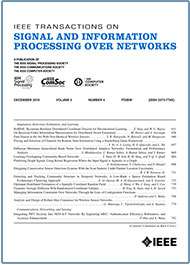- Our Story
- Publications & Resources
- Publications & Resources
- Publications
- IEEE Signal Processing Magazine
- IEEE Journal of Selected Topics in Signal Processing
- IEEE Signal Processing Letters
- IEEE Transactions on Computational Imaging
- IEEE Transactions on Image Processing
- IEEE Transactions on Information Forensics and Security
- IEEE Transactions on Multimedia
- IEEE Transactions on Signal and Information Processing over Networks
- IEEE Transactions on Signal Processing
- IEEE TCI
- IEEE TSIPN
- Data & Challenges
- Submit Manuscript
- Guidelines
- Information for Authors
- Special Issue Deadlines
- Overview Articles
- Top Accessed Articles
- SPS Newsletter
- SigPort
- SPS Resource Center
- Publications FAQ
- Blog
- News
- Dataset Papers
- Conferences & Events
- Community & Involvement
- Professional Development
- For Volunteers
- Information for Authors-OJSP
-
Home
Conferences Events IEEE Signal Processing Magazine IEEE SPL Article IEEE TIFS Article IEEE TMM Article IEEE TSP Article Jobs in Signal Processing Lectures Machine Learning Seasonal Schools Signal Processing News SPM Article SPS Distinguished Lectures SPS Newsletter Article SPS Webinar SPS Webinars SPS Webinar Series Webinar webinars
-
Our Story
What is Signal Processing?

The technology we use, and even rely on, in our everyday lives –computers, radios, video, cell phones – is enabled by signal processing. Learn More » -
Publications & Resources
-
SPS Resources
- Signal Processing Magazine The premier publication of the society.
- SPS Newsletter Monthly updates in Signal Processing
- SPS Resource Center Online library of tutorials, lectures, and presentations.
- SigPort Online repository for reports, papers, and more.
- SPS Feed The latest news, events, and more from the world of Signal Processing.
-
SPS Resources
-
Conferences & Events
-
Community & Involvement
-
Membership
- Join SPS The IEEE Signal Processing Magazine, Conference, Discounts, Awards, Collaborations, and more!
- Chapter Locator Find your local chapter and connect with fellow industry professionals, academics and students
- Women in Signal Processing Networking and engagement opportunities for women across signal processing disciplines
- Students Scholarships, conference discounts, travel grants, SP Cup, VIP Cup, 5-MICC
- Young Professionals Career development opportunities, networking
- Get Involved
-
Technical Committees
- Applied Signal Processing Systems
- Audio and Acoustic Signal Processing
- Bio Imaging and Signal Processing
- Computational Imaging
- Image Video and Multidimensional Signal Processing
- Information Forensics and Security
- Machine Learning for Signal Processing
- Multimedia Signal Processing
- Sensor Array and Multichannel
- Signal Processing for Communication and Networking
- Signal Processing Theory and Methods
- Speech and Language Processing
- Technical Working Groups
- More TC Resources
-
Membership
-
Professional Development
-
Professional Development
- Signal Processing Mentorship Academy (SigMA) Program
- Micro Mentoring Experience Program (MiME)
- Distinguished Lecturer Program
- Distinguished Lecturers
- Distinguished Lecturer Nominations
- Past Lecturers
- Distinguished Industry Speaker Program
- Distinguished Industry Speakers
- Distinguished Industry Speaker Nominations
- Industry Resources
- IEEE Training Materials
- Jobs in Signal Processing: IEEE Job Site
-
Career Resources
- SPS Education Program Educational content in signal processing and related fields.
- Distinguished Lecturer Program Chapters have access to educators and authors in the fields of Signal Processing
- Job Opportunities Signal Processing and Technical Committee specific job opportunities
- Job Submission Form Employers may submit opportunities in the area of Signal Processing.
-
Professional Development
-
For Volunteers
-
For Board & Committee Members
- Board Agenda/Minutes* Agendas, minutes and supporting documentation for Board and Committee Members
- SPS Directory* Directory of volunteers, society and division directory for Board and Committee Members.
- Membership Development Reports* Insight into the Society’s month-over-month and year-over-year growths and declines for Board and Committee Members
-
For Board & Committee Members
Popular Pages
Today's:
- Information for Authors
- (ICME 2026) 2026 IEEE International Conference on Multimedia and Expo
- IEEE Transactions on Information Forensics and Security
- Conference Call for Papers
- IEEE Transactions on Image Processing
- Information for Authors-SPL
- (ICASSP 2026) 2026 IEEE International Conference on Acoustics, Speech, and Signal Processing
- IEEE Signal Processing Letters
- 2025 IEEE SPS Chapter Initiative: S.P.A.R.C. – Signal Processing, AI & Real-time Computing Camp
- IEEE Transactions on Signal Processing
- IEEE Transactions on Multimedia
- Call for Papers for ICASSP 2026 Now Open!
- 2025 IEEE SPS Chapter Initiative: SPECTRE (Signal Processing Expo and Creatathon for Technical Research and Excellence)
- (WASPAA 2025) 2025 IEEE Workshop on Applications of Signal Processing to Audio and Acoustics
- Guidelines
All time:
- Information for Authors
- Submit a Manuscript
- IEEE Transactions on Image Processing
- IEEE Transactions on Information Forensics and Security
- IEEE Transactions on Multimedia
- IEEE Transactions on Audio, Speech and Language Processing
- IEEE Signal Processing Letters
- IEEE Transactions on Signal Processing
- Conferences & Events
- IEEE Journal of Selected Topics in Signal Processing
- Information for Authors-SPL
- Conference Call for Papers
- Signal Processing 101
- IEEE Signal Processing Magazine
- Guidelines
Last viewed:
- Ph.D. Thesis: AI-Powered System-Scientific Defense for High-Confidence Cyber-Physical Systems: Modeling, Analysis, and Design
- Information for Authors-SPL
- (ICASSP 2026) 2026 IEEE International Conference on Acoustics, Speech, and Signal Processing
- Policies and Procedures
- (ICME 2026) 2026 IEEE International Conference on Multimedia and Expo
- Governance Documents
- Call for Papers for ICASSP 2026 Now Open!
- American Epilepsy Society Seizure Prediction Challenge
- IEEE Signal Processing Letters
- 2025 Picture Coding Symposium (PCS)
- (CAI 2026) IEEE Conference on Artificial Intelligence 2026
- Signal Processing 101
- Secure Communication in Relay-Assisted Massive MIMO Downlink With Active Pilot Attacks
- IEEE Transactions on Information Forensics and Security
- Information for Authors
Impairments-Aware Resource Allocation for FD Massive MIMO Relay Networks: Sum Rate and Delivery-Time Optimization Perspectives
You are here
Publications & Resources
Transactions on Signal and Information Processing over Networks
For Authors
Top Reasons to Join SPS Today!
1. IEEE Signal Processing Magazine
2. Signal Processing Digital Library*
3. Inside Signal Processing Newsletter
4. SPS Resource Center
5. Career advancement & recognition
6. Discounts on conferences and publications
7. Professional networking
8. Communities for students, young professionals, and women
9. Volunteer opportunities
10. Coming soon! PDH/CEU credits
Click here to learn more.
Impairments-Aware Resource Allocation for FD Massive MIMO Relay Networks: Sum Rate and Delivery-Time Optimization Perspectives
In this paper, we investigate the resource allocation problem for a full-duplex (FD) massive multiple-input-multiple-output (mMIMO) multi-carrier (MC) decode and forward (DF) relay system which serves multiple MC single-antenna half-duplex (HD) nodes. In addition to the prior studies focusing on maximizing the sum-rate and energy efficiency, we focus on minimizing the overall delivery time for a given set of communication tasks to the user terminals. As our system is an FD MC system, we consider the impact of hardware distortions resulting in residual self-interference and inter-carrier leakage. We also consider that only limited channel state information is available. A joint power and sub-carrier allocation problem to maximize the sum-rate of the system is then formulated. Due to the intractable nature of the underlying problem, an iterative solution is proposed, employing the successive inner approximation (SIA) framework, with guaranteed convergence to the point that satisfies the Karush-Kuhn-Tucker (KKT) conditions. For the energy efficiency maximization problem, a two-stage iterative algorithm which follows the SIA and Dinkelbach algorithm is proposed. The operation of an FD mMIMO MC DF relay system is evaluated for different system parameters using numerical simulations. We also show the importance of considering delivery time minimization rather than sum-rate maximization, i.e., maximizing the sum-rate of the system does not necessarily minimize the overall delivery time. Numerical results show the significance of distortion-aware design for such systems and also the significant gain in terms of different objectives such as sum-rate, energy efficiency, and delivery time compared to its HD counterpart.
SPS Social Media
- IEEE SPS Facebook Page https://www.facebook.com/ieeeSPS
- IEEE SPS X Page https://x.com/IEEEsps
- IEEE SPS Instagram Page https://www.instagram.com/ieeesps/?hl=en
- IEEE SPS LinkedIn Page https://www.linkedin.com/company/ieeesps/
- IEEE SPS YouTube Channel https://www.youtube.com/ieeeSPS
Home | Sitemap | Contact | Accessibility | Nondiscrimination Policy | IEEE Ethics Reporting | IEEE Privacy Policy | Terms | Feedback
© Copyright 2025 IEEE - All rights reserved. Use of this website signifies your agreement to the IEEE Terms and Conditions.
A public charity, IEEE is the world's largest technical professional organization dedicated to advancing technology for the benefit of humanity.










